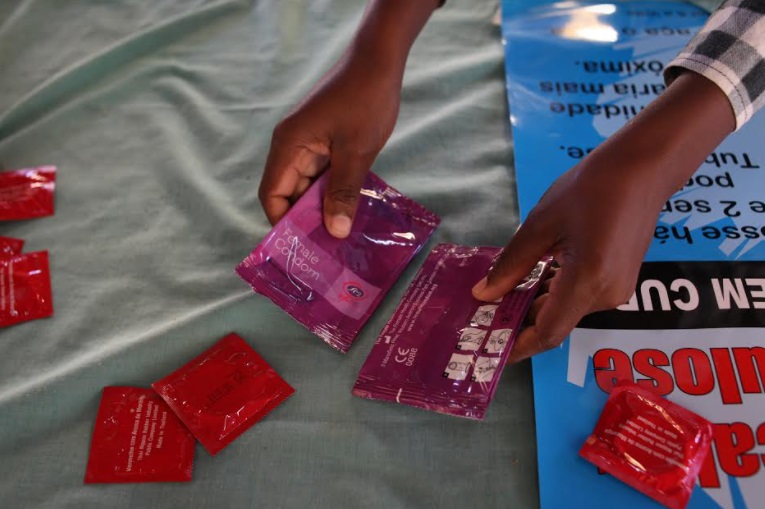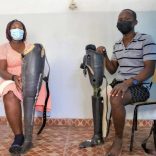Mozambique: Teacher Inácio travelled 2,000 kilometres for a prosthesis dream come true
German Cooperation supports sexual and reproductive health education in IFPELAC vocational training centres

Photo: Supplied
A hybrid meeting held at the Montebelo Girassol Hotel in Maputo on the 9th of June of this year considered the results of the “Sexual and Reproductive Health in the Context of the Alberto Cassimo Institute for Vocational Training and Labour Studies (IFPELAC)” initiative.
The initiative occurs within the scope of the partnership between the Government of Mozambique and German overseas cooperation through the Gesellschaft für Internationale Zusammenarbeit (GIZ) GmbH “ProEducação” programme.
Sexual and reproductive health education enables informed and conscientious decision-making and therefore plays a key role in the life and career planning of adolescents and young people. It reduces the risk of early pregnancies, forced and/or premature unions, unsafe abortions, HIV and other sexually transmitted infections.
These are just a few factors which can negatively impact life plans. “In the context of weaknesses in access to health, especially for women and young people, attention to this matter is urgent and necessary,” explained Júlio Langa, an consultant in the field hired by ProEducação.
The initiative has as its main objective the implementation of actions aimed at strengthening the Sexual and Reproductive Health and Rights (SRHRs) component in IFPELAC Professional Training Centres (CFP).
In this context, the Inhambane, Beira, Tete, Nampula CFPs plus the Electrotechnics Centre in Maputo city conducted a three-stage process comprising of formative research, developing an intervention, and implementing institutional strengthening actions such as meetings with different target groups (for example, parents and guardians, community leaders and neighbourhood secretaries), information sessions for trainees, training for trainers and trainers, visits to SAAJs and other organizations active in the field of SRHRs.
Langa advised each CFP on how to integrate national structures and public or private service providers in this area. “In fact, there is already a large offer in this area, but young people do not know it and, therefore, do not benefit from the offers,” the consultant noted.
The next step is to anchor the piloted activities in the CFP plans on a sustainable basis and continue to implement them in the future. How this could be done, how good experiences could be replicated and how challenges could be dealt with were all discussed by the meeting’s more-than 50 participants.
Provincial IFPELAC delegates, heads of vocational training departments and CFPs, institutional focal points on gender and health and GIZ advisors all participated.
The intervention represents an acknowledgment by IFPELAC and the ProEducação programme that graduates’ employment prospects require not only quality professional training, but also adequate preparation in terms of sexual and reproductive health and respective rights.
Deputy-director of ProEducação Ms. Katja Freitag acknowledged that the incorporation of SRHRs was yet another additional topic on the agendas of vocational education institutions and that gender and health focal points such as the trainers could not be overloaded with more and more themes. However, they must have a minimum amount of knowledge about SRHRs in order to not perpetuate taboos and prejudices. Further information could be provided by inviting external experts to information events at CFPs or by directing trainees towards appropriate advice.
Workshop participants concluded that trainees should come into contact with SRHRs themes at least once during their training at the CFP.
“With the implementation of the pilot of the SRHRs initiative, great progress has been made. However, it should be noted that many of the challenges identified in the formative research will continue to be present, requiring, therefore, a solid and continuous effort to transform and follow up on the recommendations and agreements established,” consultant Langa stressed.
As a result of the success of the pilot initiative, ProEducação will continue to focus on strengthening the educational institutions with which it works so that they effectively integrate initiatives in favour of a healthy learning environment into their mandate and actions as health promoters.
The ProEducação programme contributes to improving the educational offer in Mozambique. It operates both national and decentralised levels, focusing on developing the capacities of its partner institutions. In the past, it has contributed to the provision of HIV/health and gender focal points in all its partner institutions.













Leave a Reply
Be the First to Comment!
You must be logged in to post a comment.
You must be logged in to post a comment.